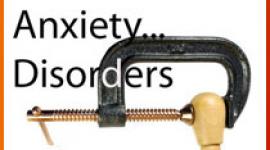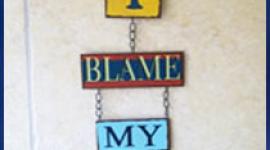Anxiety and Work
 Anxiety and work is a little discussed topic. Stress, yes. But not anxiety. Yet work has much anxiety associated with it. Our success or failure rests on our ability to deal with the unknown. Doubts about our individual competence run through us all. Some of the tasks we have to perform may be unpleasant, distressing, or irritating.
Anxiety and work is a little discussed topic. Stress, yes. But not anxiety. Yet work has much anxiety associated with it. Our success or failure rests on our ability to deal with the unknown. Doubts about our individual competence run through us all. Some of the tasks we have to perform may be unpleasant, distressing, or irritating.
In the last fifty years, a growing field of inquiry has focused on how these anxieties get handled in organizations. A seminal study was produced by Isabel Menzies Lyth (1959) on a consulting project she did with an English teaching hospital. The presenting problem was the concern voiced by senior staff that student nurses' training was driven more by work demands of the hospital than the training needs of nurses. What she discovered was an extremely high level of distress and anxiety within the nursing staff - so high in fact that about one third of student nurses left each year of their own volition.
Her initial observation was that the work of nursing is itself exceptionally anxiety-producing. Nurses work with people who are ill or dying. Wrong decisions can have devastating consequences. Nurses must respond to the distressed family of the patient. Many tasks are distasteful or repulsive.
She also observed that the way work was organized seemed directed at containing and modifying this anxiety. For instance, there was a dominant belief that if the relationship between nurse and patient were close, the nurse would experience more distress when the patient was discharged or died. Work practices encouraged distance. Nurses were required to perform a few specialized tasks with a large number of people, thereby restricting contact with any one patient. Calling patients by their condition - "the liver in bed 14"- rather than their proper name was common. Similarly, the weight of responsibility for making a final decision was mitigated in a number of ways. Even inconsequential decisions were checked and rechecked. Tasks were "delegated" up the hierarchy, with the result that many nurses were doing work well below their competence and position. In some cases subordinates were reticent to make decisions; in others guidelines were not in place to implement delegation.
These procedures appeared analogous to individual defense mechanisms. While they protected the nurses from their original anxieties, they created new ones. For instance, nurses and student nurses in particular, were given lists of simple tasks over which they had little discretion on how to perform them. Consequently they would wake patients to give them sleeping pills! They woke patients early in the morning to wash their faces before the doctors arrived, despite feeling that they would be better off sleeping. In interviews, nurses expressed guilt that they had in fact practiced bad nursing even though they carried out procedures to the letter. They knew they were not caring for patients' needs, but the system's needs.
Menzies Lyth argued that substantial parts of the hospital organization constituted social defenses (Jaques, 1955) that helped individuals avoid anxiety. The nursing management made no direct attempt to address the issue of the anxiety-provoking experiences and develop nurses' capacity to respond to anxiety in a psychologically healthy way. They did not, for instance, acknowledge that a patient's death affected nurses or provide support to deal with this and other distress. Instead, the rationale developed that a "good nurse" was "detached".
Menzies Lyth proposes that an organization is influenced by four main factors: (1) its primary task, including related environmental pressures and relationships. (2) the technologies needed to perform the task, (3) the need of members for social and psychological satisfaction, and (4) the need for support in dealing with anxiety. She argues that the influence of task and technology is often exaggerated, and that the power of psychological needs of members is generally underestimated as an influencing force. Task and technology are the framework- the limiting factors. Within those limits, the culture, structure, and mode of functioning are determined by psychological needs.
If support for anxiety is not provided, people will still find ways to insure that their anxieties are eased. The process will, however, be unconscious and covert, and the defenses developed against anxiety will become embedded in the organization's structure and culture. As we saw with the nurses, these defenses may work counter to the needs of the primary task. They may not make sense. But they are an aspect of the organization's reality to which everyone must adapt or leave.
So if we look at any organization's processes and culture, do they make more sense from a rational productivity perspective, or can they be better explained as social defenses? What about governmental bureaucratic procedures? What about the current culture of heavy work loads and long hours? As with the nursing practices, both are well in place with many people complaining about them.
The striking point arising from Menzies Lyth's study is how deeply vested we all are in the way things are done. Those of us who work to introduce change into organizations must be sensitive to how dependent we all are on social defenses. We must recognize the active function that many dysfunctional processes fulfill in the psychological lives of members if we are to keep ourselves grounded in the reality of how difficult change is to achieve.
References
Menzies Lyth, Isabel. "The Functioning of Social Systems as a Defence against Anxiety", in Containing Anxiety in Institutions, Free Associations, London, 1988. pp 43-85.
Jaques, "Social Systems as a Defense against Persecutory and Depressive Anxiety", in New Directions in Psychoanalysis, Klein, Heimann, and Money-Kyrle, Eds., Tavistock Publications, London, 1955. pp 478-498.
© 2001 All rights reserved. The authors are Brian Nichol and Lou Raye Nichol or call (919)303-5848.
next: Anxiety at Work - A Story
~ anxiety-panic library articles
~ all anxiety disorders articles
APA Reference
Staff, H.
(2001, January 1). Anxiety and Work, HealthyPlace. Retrieved
on 2026, March 2 from https://www.healthyplace.com/anxiety-panic/articles/anxiety-and-work



